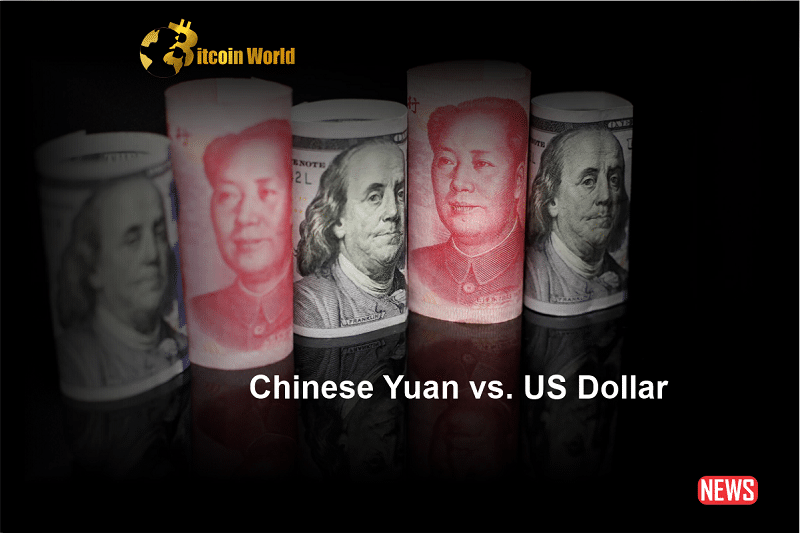Hold on to your hats, folks! We’ve just witnessed a potentially seismic shift in the world of finance. For the first time ever, the Chinese Yuan has overtaken the US Dollar in China’s cross-border payments. Yes, you read that right. This isn’t just a blip on the radar; it’s a significant milestone flagged by none other than the financial giant, Goldman Sachs.
What Exactly Happened? The Numbers Speak
According to data from China’s State Administration of Foreign Exchange (SAFE), March saw the Yuan’s share of cross-border settlements reach a record high. The driving force? A surge in foreign trading involving Renminbi assets. Think of it as the Yuan flexing its muscles on the global stage.
Goldman Sachs’ Take: Progress and Perspective
Goldman Sachs isn’t just reporting the news; they’re providing valuable context. They acknowledge China’s impressive strides in establishing the Yuan as a viable medium of exchange in international markets. The Yuan is undeniably gaining ground. However, they also point out that the Yuan isn’t quite ready to go toe-to-toe with the dollar in every arena. Here’s a breakdown:
- The Good News: The Yuan is becoming increasingly accepted for transactions, especially within China’s sphere of influence.
- The Catch: China’s capital controls and the fact that the Renminbi isn’t fully freely tradable still limit its potential as a true “store of value” and “unit of account” globally.
The Dollar Still Reigns Supreme (For Now)
Let’s not get ahead of ourselves. While this milestone is noteworthy, the US dollar remains the king of international payments. According to SWIFT data from May, the dollar still commands a hefty 43% share. The Euro (32%) and British Pound (7%) also hold significant positions, with the Japanese Yen trailing at 3.2%. Think of it like a marathon – the Yuan has made a strong push, but the dollar still has a considerable lead.
What’s Fueling the Yuan’s Rise?
So, what’s behind this surge in Yuan-based cross-border payments? Goldman Sachs highlights a couple of key factors:
- Portfolio Power: Increased investments in China’s domestic stock and bond markets are playing a crucial role. As more international investors look to China, they naturally use the Yuan.
- Hong Kong’s Hub: Hong Kong, as a major offshore Renminbi center, is seeing a rise in Yuan-denominated trading activity. It acts as a gateway for international players to engage with the Chinese currency.
Challenges on the Horizon: Store of Value and Global Reserves
While the Yuan is making headway in transaction volume, it still faces hurdles in becoming a universally accepted store of value. Consider this:
- Debt Securities: Renminbi-denominated debt securities in international bond markets account for a mere 0.7%, although this is an improvement from 0.4% a decade ago, according to the Bank for International Settlements.
- Global Reserves: Similarly, global reserves held in China’s currency make up around 3%, up from 1% in 2016. While growing, these figures are still relatively low compared to the dollar and other major currencies.
Hong Kong: A Window into the Future?
Despite these challenges, Hong Kong offers a glimpse into the Yuan’s potential. The city boasts a diverse range of Renminbi-denominated assets available to global investors. We’re talking about:
- Bonds
- Investment Funds
- Commodity-Linked Products
- ETFs
- Real Estate Investment Trusts
- Equities
- Insurance Products
This growing ecosystem in Hong Kong could pave the way for broader international acceptance of the Yuan.
What Does This Mean for the Future?
This milestone isn’t just about numbers; it’s about the evolving dynamics of global finance. China’s continued efforts to make the Yuan more accessible and international will be crucial in determining its future standing. Will the Yuan become a true challenger to the dollar’s dominance? Only time will tell. However, this latest development is a clear signal that the landscape is shifting.
Key Takeaways:
- Historic Shift: The Chinese Yuan has surpassed the US Dollar in China’s cross-border payments for the first time.
- Goldman Sachs Confirms: This milestone is highlighted in a report by the banking giant.
- Driven by Trade: Increased foreign trading of Renminbi assets is a major factor.
- Dollar Still Dominant Globally: The US dollar remains the leader in international payments.
- Challenges Remain: The Yuan’s role as a store of value and unit of account is still developing.
- Hong Kong’s Influence: The city plays a vital role in the Yuan’s internationalization.
- Ongoing Evolution: The future of the Yuan depends on China’s continued efforts to enhance its global accessibility.
The Bottom Line
The Yuan’s rise in China’s cross-border payments is more than just a statistic; it’s a symbol of China’s growing economic influence and its ambition to play a larger role in global finance. While the dollar’s reign isn’t over yet, this milestone serves as a powerful reminder that the global financial order is constantly evolving. Keep your eyes on the Yuan – its journey is far from over.
Disclaimer: The information provided is not trading advice, Bitcoinworld.co.in holds no liability for any investments made based on the information provided on this page. We strongly recommend independent research and/or consultation with a qualified professional before making any investment decisions.




